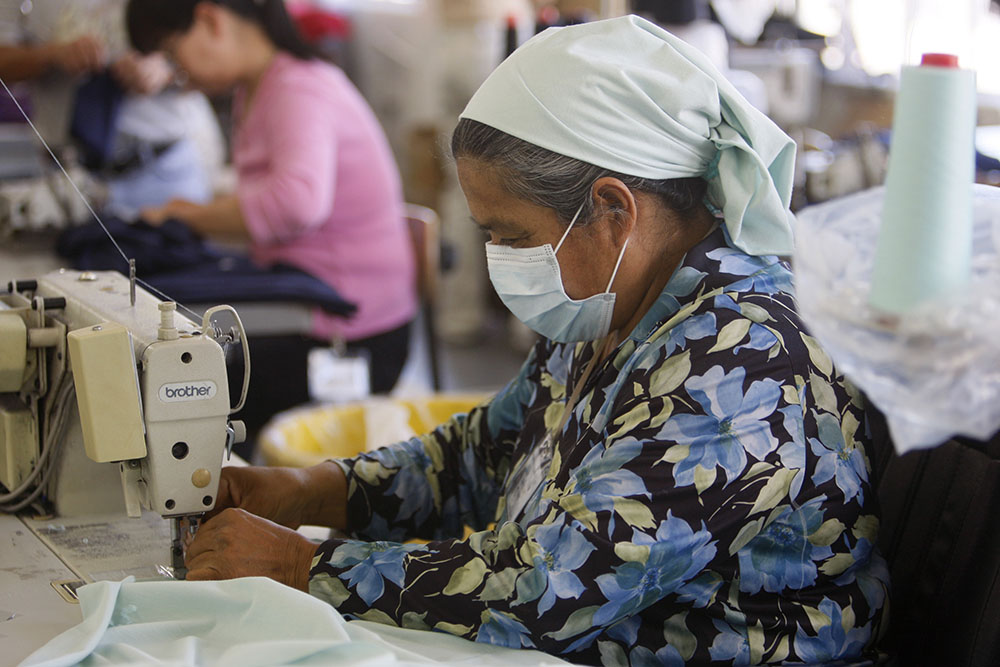
(Pixabay/Mariakray)
In 2020, our zeal to consume took a virtual turn.
E-commerce was up 44% from 2019, as major high street retailers and department stores were forced to file for bankruptcy. Food delivery apps across the board outperformed expectations, including Uber Eats, whose bookings were up 130%. Many of these food delivery apps are sustained by "ghost kitchens," which are food enterprises that exist only online and offer consumers a wider range of choices than available brick-and-mortar establishments. They allow for a cooked and delivered meal, frequently in less than 30 minutes, handed off often without any kind of human interaction.
Along with a growing dependence on quickly delivered foods, millions attempted to curb their pandemic loneliness through retail therapy, relying on retailers like Amazon to purchase everything from books to gadgets to video games. The increased demand for products, many of which were delivered in as quickly as two hours, increased Amazon's net profit by 84% from the previous year, with the corporation netting over $280 billion in sales, making Jeff Bezos $75 billion richer.
The human cost of this "convenience" has been well-documented. Workers are forced to relieve themselves in bottles for lack of bathroom breaks, some pass out on warehouse floors after being overworked, many deal with long-term conditions from the undue strain on their mental and physical health. When workers in Bessemer, Alabama, tried to unionize, Amazon used every trick in the book to stifle workers' self-organization for better conditions.
This shift toward digital consumption, of course, was largely due to the pandemic and the social distancing it required to keep one another safe. But the pandemic did not initiate the trend toward digital commerce and decreased human interaction — it only accelerated its imminent trajectory.
Our increased online consumption comes from the American lust for convenience: We want as many things as our money can buy and we want these products as easily, cheaply and quickly as possible. For many Americans, ownership of any kind — whether it's an appliance or an acre of land — is synonymous with what it means to be free and liberated in the U.S.
Advertisement
The association of freedom with ownership and individualism is in fact the logic of capitalism, and the trend toward digital commerce and decreased human interaction is part and parcel of the need for capitalists to cut costs in order to maximize profits. The variable costs that human labor requires, and the protections needed to safeguard human life — paid time off, health care, maternity leave — are seen as obstacles to increasing profits. We have built an economy that works to amass greater wealth, not an economy that works to serve human life.
This love for convenience is exacerbated by our culture's celebration of "efficiency," a desire to maximize output, to have and possess as simply and quickly as possible. Because we ourselves are overworked, suffering from a burnout culture, we try to expedite facets of our basic human functions and entertainment, like having groceries delivered with the click of a button, or binge-watching shows, or doom-scrolling on social media, or ordering takeout, as ways of mindlessly consuming at as little cost as possible to ourselves.
New services in New York offer delivery from bodegas (where customers have long known their shopkeepers by name) in 15 minutes or less, with costs of more traffic and pollution, expanding the gig economy, and further erosion of the casual interactions and chance encounters that have long sustained senses of community in urban neighborhoods.
We are conditioned to believe that efficiency helps our society grow and flourish, but it actually just further blinds us to those whose labor is most exploited.
This unquestioned love for maximizing output is endemic to 20th-century living. Efficiency dominates the logic of production under capitalism, where costs (usually on the labor front) are minimized to amass the greatest profits possible. But efficiency also dominates our approach to consumption, as we are encouraged to purchase and discard more and more: through fast fashion, through cheaply made furniture and through any number of industries encouraging consumers (often through social media) to keep up with trends, made attainable through concerningly low prices.

An immigrant from Mexico works at an apparel factory in downtown Los Angeles. (CNS/Reuters/Lucy Nicholson)
This approach to consumerism is largely (though not exclusively) a Western phenomenon. Despite making up only 12% of the global population, the U.S. and Western Europe account for 60% of private consumption spending.
Countries in the Global South are forced to shoulder the environmental and labor burden of excessive consumerism: Millions of workplace injuries go undocumented, while the environmental toll will disproportionately hit countries like Bangladesh in the contemporary crisis of eco-colonialism. And when our only interactions with the workers and service providers are virtual, or even nonexistent, relegated to digital interfaces designed for convenience alone, their exploitation becomes an easier pill to swallow.
No real change will come until our society acts on a fundamental truth: Real value is not produced by shareholders, market projections or convenience, but by human labor.
This logic was first articulated by Karl Marx, whose labor theory of value purports that an object's economic value comes from the labor required to produce it. But our capitalist culture seeks to remove traces of human labor from goods. Commodity fetishism is what happens to our culture when we fail to attribute that humans create every good we consume, and any value comes from human labor.
How often do we question who made our sweater, or the coffee we're drinking, and which workers toiled in fields to source the raw materials required to produce these goods? Companies generally don't like to focus on that either, since the exploitation latent in these struggles reveals paying workers the least amount possible in order to extract the maximum amount of value from them.
Because capitalism tends to ignore the realm of human relations (chiefly, labor exploitation) in which goods are created, this inability to distinguish humans from goods resonates with what Pope Francis has described as "throwaway culture." An economy that lacks ethics leads to a culture in which we treat people like goods that we can simply discard when we no longer have use for them.

Workers sort coffee beans in Semarang, Indonesia, in 2017. (CNS/Antara, Aditya Pradana Putra via Reuters)
"Consumerist individualism has led to great injustice," Francis wrote in Fratelli Tutti. "Other persons come to be viewed simply as obstacles to our own serene existence; we end up treating them as annoyances and we become increasingly aggressive. This is even more the case in times of crisis, catastrophe and hardship, when we are tempted to think in terms of the old saying, 'every man for himself.' "
Some approaches to tackling excessive waste and reckless consumption tend to individuate our solutions. We are encouraged to shop local or to patronize small businesses. While these are not necessarily bad things to do, they will not solve our consumption crisis. Worse, small businesses often tend to offer lower wages and worse benefits, and the lack of centralization makes it harder for workers to unionize.
Attempting to be more ethical in our spending can be important for raising social consciousness and thinking critically about supply chains. But ethical consumption under capitalism is impossible, and evaluating our consumption habits should be seen solely as a means of raising awareness about the political solutions that are required to create meaningful change.
As Catholics, we have a duty to act, to engender, as Francis writes, the "fundamental renewal of hearts and minds so that the human person may always be placed at the center of social, cultural and economic life."
Capitalism requires us to do the opposite, to pray to the church of efficiency without any regard for the welfare of those making our convenience possible. Prayer for our fellow man is always important, but remaining complicit and refusing to alter anything about our way of life, lest our "freedom," "efficiency" or "convenience" be challenged is nothing short of sinful.
We must first diagnose the problem correctly: Capitalism, not consumption, is the problem. By embedding endless growth, infinite production and decreased protections of workers into the logic of its system, capitalism has proven that it is broken beyond repair.

In Oakland, California, on Feb. 20, people protest Amazon's treatment of employees and its attempts to thwart formation of a union for workers. (Dreamstime/Sheila Fitzgerald)
Capitalism's desire to put profit and abstract ideals of economic liberty and consumerism above life itself is purely antithetical to what it means to be pro-life, or to follow Catholic social teaching. But even if we value liberty and freedom, which we should, capitalism has only provided us with the illusion of choice. Under capitalism, humans are alienated from our own creative potential, as we do not have any say in the forces that shape the consumption and distribution of our labor. We are, in effect, wage slaves, forced to sell our labor in a system over whose shape we have no control.
What might a solution look like?
Our duty is to advocate for a moral, anti-capitalist economy. This is, of course, not to advocate for the rigid state communism of the Soviet Union. Far from the conservative caricatures of how socialism or communism are restrictive of "freedom," we must understand how we are not as free as we wish to believe under capitalism, and how the "freedom" we enjoy in Western liberal democracies comes at immense cost to people throughout the Global South: both through unethical supply chains and through deadly foreign policy decisions made with the sole purpose of upholding American capitalist supremacy.
In the short term, we must robustly support union drives, policies that work to raise the minimum wage (if it were to keep up with inflation and productivity, it should actually be $24 or more), and efforts to redistribute the wealth created by production to workers, who are the ones actually creating value.
But we must understand that these reforms are not the solution, but mere stepping stones to a just economy characterized by collective ownership of wealth, workers' self-organization and self-determination, and the sanctity of all forms of life as our sole driving factor.
The earliest Christians, after all, lived communal lifestyles, and in their understanding of the material world as ephemeral, rejected the impulse to own and possess indiscriminately.
"God meant for things to be much easier than we have made them," Dorothy Day once famously wrote. Perhaps through both prayer and action, we might follow their example.




